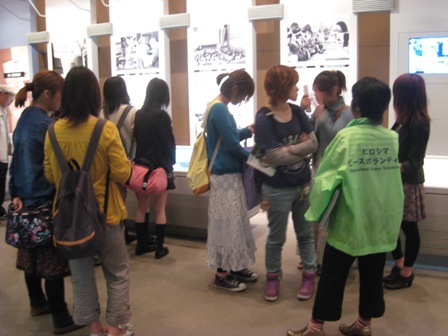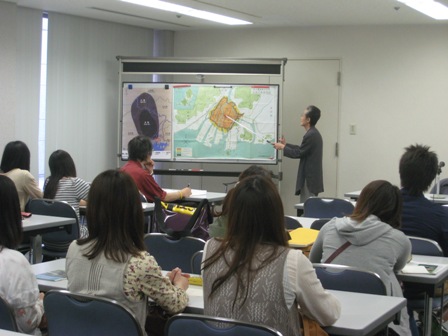Topics 2010
Study Tours from Hiroshima Shudo University and Students' Comments
1.Study Tours
ome 50 students who have taken the Hiroshima Studies course at Hiroshima Shudo University, took a tour of the Hiroshima Peace Memorial Museum and the Japan Maritime Self Defense Force 1st Service School in Etajima, Hiroshima Prefecture, in two groups, on Saturday, May 8, and on Saturday, June 5 respectively, to learn more about peace issues.
After the visit to the museum, each group listened to an atomic bomb survivor and deepened their understanding of the reality of the A-bomb experience.
Group A (Tour on May 8)

Tour of the Hiroshima Peace Memorial Museum

Listening to an A-bomb survivor
Group B (Tour on June 5)
Tour to the Hiroshima Peace Memorial
Museum
Listening to an A-bomb survivor
2.Excerpt from the students' comments following the field study
Many years have passed since the last time I visited the Hiroshima Peace Memorial Museum when I was in elementary school.
I am very interested in it because I am from Hiroshima.
This was the first time I was able to learn the reason why the A-bomb dropped on Hiroshima.
I was shocked again by its cruelty.
The A-bomb survivor's story conveyed tremendous tragedies and suffering to me.
I felt that the devastation caused by the A-bomb must have been unimaginable.
Its cruelty was beyond description.
I realized just how peaceful of a time I am now living in.
I wish, from the bottom of my heart, to eliminate all nuclear weapons from this earth as soon as possible.
It was a good opportunity to learn more about the reality of the atomic bombing.
Today I visited the Hiroshima Peace Memorial Museum and listened to a survivor's testimony. Although I grew up in Hiroshima and have had repeated opportunities to receive peace education, today I learned many new things. My perception as a university student has changed compared to before. When I was in elementary and junior high-school, I just felt pity and cruelty. Now I realize that we should not repeat the war and such atrocities again. I looked at those dreadful pictures and exhibits and listened to the survivor's story carefully. However, a one-day peace study is not enough to learn everything. I want to learn more. Thank you for today's precious lesson.
I think that wars are cruel and dreadful. When we went down to the basement to look at the survivors' drawings, I felt that their drawings conveyed their feelings. Some people looked in vain for a well for water, some died soon after drinking water and there are survivors who even now regret that they could not give water to other victims. I understood their messages. I was shocked by a survivor's story that her body was pierced by broken glass pieces due to the A-bomb blast, and the pieces have been making sounds inside her body. She said that operations to remove the glass pieces were currently ongoing. I hope her pain will abate. With Ms. Matsumoto's words, it seemed like the sun dropped to the earth, had a great impact. Buildings could be reconstructed again. Plants would grow again over time. However, the survivors' mental anguish hasn't mended for 65 years. I think that it is reality of nuclear weapons and wars.
Through survivor's story, I re-realized the incredible past event. I always felt the survivors lived in fear since the A-bombing. But, through Ms. Matsumoto's story, I realized that they have struggled to live without leaving any room for fear as they were facing death. Some people were killed by the A-bomb. Some killed themselves. Some died due to disease caused by after-effects of the A-bomb. The A-bomb deprived victims and their families of their whole lives instantly. So we should not use nuclear weapons again.
It was a good opportunity for us to listen to the survivor's story. I am not a survivor and haven't experienced what they have gone through, but I promise to convey the survivors' messages as much as possible, as the last generation who can listen to survivors' stories directly. It is our duty.
After finishing today's fieldwork, you may think this sounds cliché, but I thought that we should not repeat the evil. So it is important that we hand down something to future generations. It was a good opportunity to listen to Ms. Matsumoto's experience. How brave people in Hiroshima were! I was touched with the strength of Hiroshima.
I was shocked to listen to the survivor's story. She was burned on the back and other parts of her body, but she has never given up living. She is very strong. She often wanted to kill herself, but she did not give up living for her grandma. She lived because she had a family member at that time. How important families are! It took 50 years for Ms. Matsumoto to be able to talk about her war experience. My grandma also needed the same time before talking. I want to listen to more stories in her life time and learn the value of peace and what happiness is.
I learned the postwar reality through today's story. I had several opportunities to listen to war stories, but not postwar stories. Her harsh life and that of her family's were beyond my imagination. It is a sin to think nothing of the meaning of the peace that we now enjoy. It is our duty to pass on the post war reality to our future children.
I learned many things today. This was my first time back to the Hiroshima Peace Memorial Museum since I visited there in elementary school. I was embarrassed by my superficial knowledge after listening to the peace volunteers' explanations. I used to think that nothing could be changed by just one person appealing for peace. Nuclear weapons are dreadful. I want to do something; it's my responsibility to help rid the world of nuclear weapons. I realized how happy my life in Japan now is through the survivor's story. She must have suffered to live through all the years after the A-bomb. I want to tell my future children what happened in Hiroshima.
Today I re-learned tragedies of the A-bomb. I think that all nuclear weapons should be abolished from the earth after knowing the survivors' harsh experiences. Unfortunately there are many nuclear weapons in the world, but I hope to realize a world without nuclear weapons as soon as possible. As I listened to her story, I understood just how lucky we are today. We didn't experience the A-bomb, but have to understand the tragedies of wars and pass them on to the next generations.
Can we share the tragedies and reality of the A-bombings only in this kind of planned event like this fieldwork? If the memories of the A-bomb are stored only in the Peace Memorial Museum, then it would be difficult for our generation to face its reality. How should we hand down the "real voices of survivors' experiences" to the next generations?
I noticed my shallow knowledge on the A-bomb and wars through today's talk. Before listening to the stories, I thought that we could not avoid wars and conflicts, which are a part of human history, and which have been generating casualties. However, today I think that we should try to make a world without any conflicts before defining human history as war history.
The fieldwork deeply conveyed the real feelings of the war victims and survivors who miraculously escaped from death. We have to abolish nuclear weapons because they inflict tremendous pain physically and psychologically on us. I was embarrassed that foreign youth are much more interested in the A-bomb than us in Hiroshima. Thank you for telling us about the harsh experiences. Thank you for telling us to live for the moment. It is our duty to hand what we have learned down to future generations. I was moved very much.
This field brought me back to the Hiroshima Peace Memorial Museum for the first time in a long time. I learned that the war lasted psychologically for the 65 years after the end of the Second World War in 1945. It is our duty to deal with many issues. Through Ms. Ikeda's story, I understood that the A-bomb and wars will destroy people physically and psychologically. Just listening to her story made me feel hopeless, let alone how hard the survivors' actual lives were! Our next generation won't be able to listen to A-bomb survivors' stories directly. Therefore, it is our duty to fully understand survivors' messages and hand them down to people of the world.

